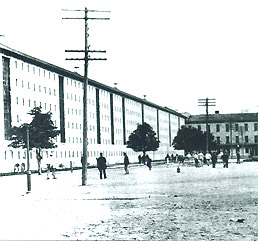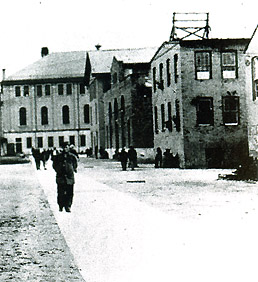I was almost forty years old when I found out my father had been in prison. It came from a conversation I had with my older brother in April of 1970. After an estrangement of ten years, we met in Manhattan and spent three days together in the city walking and talking.
On the last day, while strolling in Central Park and talking about our parents, my brother, Mike, told me he believed that our father had served a prison sentence before I was born.
My father’s time in prison – in Sing Sing Prison as I would later learn – was not something my brother could speak about with certainty, but rather something he suspected; his suspicion came from a vague childhood memory of visiting him in prison.
Michael, eleven and a half years older than I, thought the visit had taken place when he was about five years old. Unsure if he remembered accurately or perhaps suffered a disturbing dream as a young boy, he never dared broach the subject with our father.
Sing Sing Prison grounds.

Left side of an image of a Sing Sing grounds scene during recreation hour, circa early 1920s.
[The scene appears in both Robert L. Gold's Westchester Historian article and in Guy Cheli's Images of America: Sing Sing Prison book, from which this and the other images of this scene were scanned for the NYCHS presentation of Gold's article. Gold's caption credits the Westchester County Historical Society Hufeland Collection.]
|
|
Certainly, it could have come in a dream, confirmed in later life, since Mike himself had been in prison for sixteen months. A navigator on a B-17 shot down over Germany during World War II, he had been imprisoned in a Stalag, north of Berlin. When my brother came home from the war, we slept in the same room and I recall his anguished dreams often accompanied by screams and sweating.
After our conversation, I resolved to learn if my father, in fact, had been in prison. I was always close to my dad and knew, however difficult the answer might be for him, I could ask him the question. Two weeks later, when I visited my parents, I asked Dad if he had been in prison and learned the truth.
At first, he denied it. I asked him after dinner as we were throwing a baseball back and forth in the backyard. I remember he shook his head and said, “Where did you get that idea?” I told him about Mike’s memory and he shook his head again.
But, on a long walk we took the next day, Dad admitted he had lied. Although almost thirty years ago, I recall exactly where he told me the truth. It was beside an enormous oak tree whose roots had pushed the sidewalk up where we stood, only a block from the second-floor apartment where my parents lived in Staten Island.
Sing Sing Prison grounds.

Right side of an image of a Sing Sing grounds scene during recreation hour, circa early 1920s.
[The scene appears in both Robert L. Gold's Westchester Historian article and in Guy Cheli's Images of America: Sing Sing Prison book, from which this and the other images of this scene were scanned for the NYCHS presentation of Gold's article. Gold's caption credits the Westchester County Historical Society Hufeland Collection.]
|
|
I can see it all now, as I saw it unfold in front of me so many years ago. We were walking along side by side when he stopped abruptly and turned to me. Looking into my eyes, Dad said without a pause, “I’m sorry, son, I lied to you yesterday. I served five years in Sing Sing for armed robbery.”
And then, in one of life’s unforgettable moments, I asked him why he had never told me about his time in prison. “Because I was afraid I would lose your love,” my father said softly, looking off into the distance.
This reply, that still brings tears to my eyes, emerged from the tight-lipped mouth of a tough, Humphrey-Bogart type man, whose sense of masculinity never allowed more than a handshake with his sons.
I still can picture him standing there facing me, his light blue eyes peering at me from beneath the curved brim of his gray fedora. Dad, a slender sinewy man even at 71, had a lighted Pall Mall cupped in his hand.
When I said, “That never would have happened,” I remember he reached out and squeezed my shoulder. And, then, we continued our walk without any more mention of prison that day.

